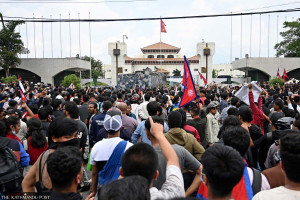Opinion
Imminent change
The appointment of law enforcement authorities will be decided by the electoral constituency in federalism
Prakash Bom
One of the fundamental contributions of federalism to democracy is that it regulates the people’s participation in the procedural mechanism of law enforcement and the court system. A legal and judicial system that excludes the people’s participation cannot correctly enforce rule of law and deliver justice. Federalism, therefore, can increase people’s access to justice in marked ways.
Laws under federalism
Under a proper federal system, at the national level, the attorney general of the nation is nominated by the executive head of government and appointed through a Parliamentary hearing procedure. The Office of the Attorney General administers the National Investigation Bureau to enforce the rule of law, protect the constitution of the nation, look after issues of national security and control crimes at the national level. There is no federal police force at the national level because the state police force mechanism is responsible for the local security of where the central government is located.
In every federal state, the appointment of law enforcement authorities—attorneys and police officers—will be based on the premise of electoral constituency. That is to say, appointees must be permanent residents (taxpayers) of the constituency where they will be posted to enforce the rule of law, whether in the whole of the state or a local police precinct in smaller districts of the state. This will mean that law enforcement authorities of one state or district cannot be transferred to another state or district under the federal system. The fundamental objective of this mechanism is to manage local human resources that will be held responsible and accountable for the services they provide to the citizens of the constituency in terms of enforcing the rule of law. Under this system, law enforcement authorities have right to autonomy in order to enforce the rule of law under the constitution of the nation and by the specific law of each federal state.
Concerning appointments, the state attorney will be either appointed by the state assembly council through an assembly hearing procedure as per the recommendation of the governor (or chief minister) or directly elected by the people through the ballot. The chief of law enforcement, namely the police chief, of the State will be appointed by the state assembly council as per the recommendation of the state Cabinet. District attorney appointments will be administered by the office of the state attorney and will need approval from each district assembly. Similarly, municipal assemblies will approve the appointments of police officers and personnel as per the recommendation of mayors. The district attorney will look after municipality law enforcement and court proceedings. In all of these appointments, the nominees must be permanent residents (taxpayers) of the state.
Courts under federalism
At a national level, there will only be one Supreme Court and it will be an independent institution. The fundamental responsibility of the Supreme Court is to interpret the nation’s constitution. Cases registered at the Supreme Court must concern a violation or misinterpretation of the nation’s constitution at all levels. Supreme Court judges will be nominated by the executive head of government and appointed through Parliamentary hearing procedures.
Under federalism, every federal state will have a state supreme court and its fundamental responsibility will be to interpret the law of the state under the larger ambit of the constitution of the nation while also managing the state’s court system and appointment mechanism for district judges. Under the state court, there will be two divisions of district courts—for criminal justice and civil cases.
Similar to law enforcement officials, state supreme court judges will be nominated by the chief minister or governor of the state and appointed through a state assembly hearing procedure or nominees are directly elected by the people from the ballot. The two divisions of district courts (civil and criminal justice) judges will be nominated by the state judicial council and appointed after a state assembly hearing.
The appointment of judges to the state supreme court and district courts will be based on the premise of electoral constituency and professional expertise. Since the nominees will need to be permanent residents of the state where they will be appointed, judges from one state or district cannot be transferred to another state or district.
Since federalism is imminent in Nepal, at this juncture, the choice of the law enforcement and the court system unlike India’s will make a lot of difference in terms of enforcing the rule of law and delivering justice that can eliminate culture of impunity and corruption. These two systems are interconnected in federalism in enforcing the law and delivering justice.
Bom is associated with the Non-Resident Nepali Association, New York, US




 5.55°C Kathmandu
5.55°C Kathmandu












